- Home
- Mary Downing Hahn
Promises to the Dead Page 4
Promises to the Dead Read online
Page 4
"I hear he fathered the boy, too," Uncle Philemon said. "Now the fellow's dead. Killed falling off his horse. Oh, it's terrible sad how fast misfortune comes to us all."
Delia glanced at me and frowned as if she'd forgotten I was sitting there, listening to every word. "You look poorly, Jesse. Why don't you go on up to bed and get yourself some rest?"
Uncle Philemon nodded. "Yes, run along, boy. You shouldn't have been out in all that wind and rain. Not good for a child. Get pneumonia that way."
Delia gave him one of her sharp looks. "My, my, Mr. Philemon, you sure do change your tune, don't you?"
Uncle Philemon paused with a spoonful of soup halfway to his mouth. "What the devil do you mean, Delia?"
"Wasn't it you who sent Jesse down to the marsh, claiming bad weather was no threat to a boy his age?"
Uncle Philemon's face flushed. "I said no such thing, Delia. And don't you go arguefying with me, or I'll send you off to Slattery's to join your niece."
"Yes, sir, Mr. Philemon." Delia picked up the soup tureen and headed for the kitchen, more mad than scared.
"Now, now, Delia, don't go off in a huff," Uncle Philemon called after her, shouting to be heard above the clatter of dishes. "You know I didn't mean it. I ain't sending you nowheres."
Delia poked her head into the dining room. "Just make sure that boy goes to bed. I don't want him getting sick on account of your old turtle."
"You heard Delia," Uncle Philemon said. "Go on upstairs, Jesse."
When he spoke, I was already halfway up the steps and glad to go. I couldn't bear to hear one more word about Colonel Abednego Botfield, the Widow Baxter, Lydia, or anyone else, living or dead, slave or free. I just wanted to go to sleep and forget the mess I'd gotten myself into.
CHAPTER 5
The next day was Sunday, which meant church. Reverend Greenberry went through his prayers and familiar routines, but after he read the Gospel, he gripped the sides of the lectern and gazed out at us with a worried look.
"I'm going to base my sermon today on a reading that comes up later in the church year," he said. "The times being what they are, my conscience demands I speak out. And I can find no better words than those of the prophet Ezekiel, chapter two, verses one through seven."
Clearing his throat, Reverend Greenberry began to read from the Bible in his shrill Yankee voice: "Son of man, I send you to the children of Israel, to a rebellious nation that hath rebelled against me.... they are impudent children and stiffhearted.... be not afraid of them ... though briers and thorns be with thee, and thou dost dwell among scorpions: be not afraid of their words, nor be dismayed at their looks, though they be a rebellious house.... speak my words unto them, whether they will hear, or whether they will forbear: for they are most rebellious."
It didn't take anyone long to figure out where Reverend Greenberry was heading with this reading. People began to shift and stir. They whispered among themselves. The second time the reverend said "rebellious," Uncle Philemon began thumping his cane on the floor. Others cleared their throats and twitched and coughed.
Reverend Greenberry peered at us. "A rebellious house," he repeated as if we hadn't already heard. "Any state that leaves this union blessed by God Almighty is indeed a rebellious house and will have no favor in the eyes of the Lord."
Uncle Philemon thumped his cane even harder. Several other gentlemen joined him. A familiar voice in the back of the church drawled, "Yankee fool." I looked around and saw the Widow Baxter, dressed in black, her face hidden by a veil. Her uncle, Colonel Abednego Botfield, slouched beside her, eyeing the reverend with scorn.
"The Lord is asking us to speak out, just as He asked Ezekiel." Reverend Greenberry spoke louder and smote the Bible with his fist. "The Lord wants us to speak the truth, to stand up for justice and freedom for all. If Mr. Abraham Lincoln calls upon us to take a stand against the rebels, we must go where he bids us and do what he asks! Above all, this state must not join the house of rebellion!"
Unfortunately for Reverend Greenberry, there were few who agreed with him. It was shocking to hear them shout and call out against him and pound the floor. Never had I seen such carrying on in church. Truth to tell, it scared me.
"Go preach to the Methodists," Uncle Philemon bellowed. "You'll find fertile ground among them abolitionists."
"Or the Quakers," Colonel Botfield shouted. "They'll listen to your braying cant!"
"It's you who need to hear the Lord's will," Reverend Greenberry proclaimed. But his voice shook, and he was mighty pale. If he hadn't had the lectern to hang on to, I think he'd have fallen to the floor in a dead faint.
Uncle Philemon rose to his feet. "I ain't trusting no Yankee to tell me the will of God Almighty," he roared.
With that, he shoved me out of the pew ahead of him and started for the door. Most of the congregation followed us.
"That's the last time I go to church," Uncle Philemon said when we got outside. "Never liked that fool's sermons anyway."
Normally I didn't care much for church myself. Reverend Greenberry had a way of droning on and on till the whole congregation fell asleep and had to be waked by a peal from the organ. But today he'd been a sight more interesting. Not one single person had so much as closed an eye during his sermon. Though I didn't dare say it, I halfway admired him for speaking his piece so boldly. But I still wasn't sure about Mr. Lincoln's notions being the Lord's will.
Church had given Uncle Philemon such a powerful thirst he took himself off to the tavern, leaving me to walk home alone. The road led past Miss Sally's house, so I stopped to see how Perry was. The old lady must have been watching for me. Before I had time to knock, she opened the door and beckoned me inside.
"I was hoping you'd come soon. The colonel's been by again. This time he stopped and asked me if I'd seen Lydia and the boy. I told him no, but I'm not sure he believed me. I'm scared he'll come with his dogs next time."
I looked around, but I didn't see a sign of Perry. Before I could ask, Miss Sally told me he was in the fruit cellar. "It's safer down there."
"How's he feeling?"
"Poorly. He misses his mama something fierce, plus he's got a touch of fever. You want to pay him a little visit?"
Miss Sally went to a corner of the room and rolled back a rag rug hiding a trapdoor. I followed her down the steep steps to the cellar. In the light of a lantern, I saw Perry lying on a cot, his back to the room. Miss Sally patted his shoulder. "Hey," she whispered, "Here's your friend Jesse come to see how you are."
Perry didn't move. "He's not my friend, and I don't want to see him," he muttered. "Tell him to go away."
Miss Sally sat down beside him. "Now, Perry, what did we talk about this morning?"
"Going to Baltimore on the boat."
"And who's going with you?"
"Nobody. I'm going by myself."
Miss Sally sighed and beckoned me closer. "Sit up now, Perry, and talk to Jesse like a good boy. He's put himself at risk for you. The least you can do is show him some courtesy."
Perry rolled over and faced me, but he didn't sit up and he didn't smile and he didn't show any signs of courtesy. "I don't need him to take me to Baltimore. I can get there on my own."
Though I was trying to be patient, Perry was just too contrary for me to hold my tongue. "You ain't old enough to go to Baltimore by yourself. Why, I bet you don't even know where it is."
"It's across the Bay, up north," Perry said, but I could tell he had no notion which way north was.
"If you ain't the most ignorant boy—" I began but Miss Sally hushed me with a sharp look.
"You heard what your mama said," Miss Sally told Perry. "It was her wish that Jesse take you. He'll keep you safe."
Perry scowled but said nothing. From the look on his face, I reckoned he didn't believe I could keep myself safe, let alone anybody else. Maybe he was right to think so.
Miss Sally frowned. "You'd best get used to the idea, Perry. Jesse is taking you to Baltimore, and that's that."<
br />
Perry turned his back to us again. I had a feeling he'd started crying. Missing his mama, I reckoned. I knew how he felt, but I kept quiet. He didn't want comforting. Not from me at least.
Giving up on Perry, Miss Sally told me she'd made arrangements with her brother, Captain William Harrison. "He expects you on board his boat before his crew arrives. Come here around midnight on Thursday, and I'll have Perry ready."
She led me back to the kitchen and hid the trapdoor under the rug. "Don't let the child upset you," she said. "He's taking his mama's death real bad. Sometimes I think he blames us both for losing her."
I didn't say nothing, but Miss Sally's notions seemed daft to me. Let Perry blame the Widow Baxter, let him blame the colonel, let him blame the recently departed Mr. Peregrine Baxter. They were the ones who'd caused all the trouble. Not me or Miss Sally. In fact, it was downright rude of Perry to blame me just because I was handy and the true villains weren't.
"You don't care for the child, do you?" Miss Sally peered into my eyes, seeking the truth.
"He puts on airs," I muttered, "and he talks fancy. Why, he speaks better than me and he's a slave. Don't seem natural somehow."
Miss Sally sighed. "I don't approve of Mr. Peregrine Baxter's behavior, but he must have cared some for Perry or he wouldn't have took the time to teach him to speak like a gentleman."
Somehow that didn't make Perry any better. Nobody had ever cared enough for me to teach me much of anything. Not that I wanted to learn. But still it rankled me somehow to think of that child knowing more of the King's English than I did.
"Jesse, for goodness sake," Miss Sally said. "Don't stand there pouting. Suppose your face freezes like that?" She gave me a little shake. "Just thank your stars Abednego Botfield ain't searching for you."
There was some truth to what she said, but it seemed likely the colonel might be searching for me as well as Perry one of these days. Anyways, I straightened up a bit and tried to change the look on my face.
"That's better," Miss Sally said. "You just remember what Perry's been through, losing his mama and that little baby and now going off to Baltimore with a boy he barely knows. His troubles aren't over, not by a long shot."
I wanted to say my troubles weren't over either, but it made no sense to keep on arguing.
Miss Sally gave me a little hug and told me to go on home. "Stay away from here till Thursday night," she said. "The colonel's most likely watching the house."
The way Perry acted, I would have liked to stay away forever, but I'd made a promise and I meant to keep it.
***
The days of the week slid past quicker than I'd thought they would. Morning and night, raggedy V's of Canada geese flew overhead, baying like hounds. The trees put out little gold leaves, and the robins came back, but the weather stayed cold and gray.
News of the war kept Uncle Philemon in a constant uproar. First, we heard the federal army had surrendered Fort Sumter to the rebels without a single soul dying, which my uncle claimed was evidence Yankees were cowards to the core. Then Mr. Abraham Lincoln did just what my uncle predicted. He called up an army. Wanted 75,000 men to volunteer to quell the Confederates.
Worse yet, Mr. Lincoln aimed to send his army to South Carolina on the train. Boston, New York, Philadelphia—no matter where the train started up north, it couldn't go south without going through Baltimore.
"An invasion, that's what it is," Uncle Philemon hollered.
How could it be an invasion, I wondered, seeing as how Baltimore was in the United States of America same as those northern cities, but I didn't dare ask. Uncle Philemon was far too het up already.
"We have to secede now." Uncle Philemon pounded the table so hard he knocked his glass over and spilled a river of red wine across the white cloth. "Before the despot's heel grinds us into the dust!"
While Delia mopped up the wine, fussing to herself in a low voice, I stared agape at Uncle Philemon. His face was so red I expected him to drop dead of apoplexy right in front of my eyes.
"Ain't you heard what's happened?" he asked me. "A passel of Mr. Lincoln's Yankees from Pennsylvania passed right through Baltimore on their way south today. Maryland can't put up with that!"
He gulped a mouthful of wine from the glass Delia had refilled. "They're expecting more Yankee troops on Friday. By God, I'd give a million dollars to be in Baltimore. I'd teach those pusillanimous pups a lesson!"
"Good thing you ain't got that kind of money," Delia muttered. "You'd get your fool head blown off for sure."
Uncle Philemon belched and glanced around to see if we'd noticed. Delia and I acted as if we hadn't heard a thing, so he cleared his throat and went on with his tirade about states' rights and Mr. Lincoln and the Yankees, abolitionists, and other villains seeking to ruin the nation.
Neither Delia nor I listened to a word he said. She went about her business serving food and I ate it, but I didn't much enjoy it. I couldn't help worrying about what might happen Friday, the very day I was supposed to take Perry to Baltimore.
CHAPTER 6
Thursday night, just after the clock struck midnight, I crept out the door. A couple of hounds came along with me. I reckoned they smelled the food I'd stuffed in my pockets, but they lost interest before I reached the road. They probably caught a whiff of coon or fox, because they took off toward the woods, and I saw no more of them. Which was just as well. Uncle Philemon would have been a sight more upset to lose those hounds than me.
I sneaked around to the back of Miss Sally's house and knocked on the door real soft. She opened it right away, like she'd been waiting with her hand on the knob. Perry was sitting in the rocking chair staring at me, his face closed up tight as a fist.
Miss Sally put her arms around him and held him tight, but the expression on his face didn't change. "You must go with Jesse now," she told him. "I'd keep you with me if I could, darling, but it's too dangerous here." She let him loose slowly and wiped her eyes with her apron.
"I told you I don't want to go with that boy," Perry muttered.
"You think I like you any better than you like me?" I asked, feeling ugly toward him.
Miss Sally hushed us. "Boys," she said, "you must be friends, you must help one another. Once you leave William's ship, you'll be among godless men for sure."
Pulling us together, she commenced to pray loudly for our safety and our brotherhood. "Believe me," she ended, "you'll never be out of the good Lord's sight. He'll be holding you both in the palm of His hand."
Though I kept my thoughts to myself, I hoped the Lord would keep a better grip on Perry and me than he'd kept on many another person I could name. Lydia, for one; Mama, for another. He had surely let them slip away into the darkness without paying any heed.
Perry didn't come fast or even willingly, but at least he allowed me to accompany him to Captain Harrison's dock. When we got in sight of the Sally H.'s masts, we hid in the tall marsh grass and studied the scene. Nothing seemed amiss. No strangers about, no horses.
But just as I stepped out of the shadows, Captain Harrison appeared on the ship's deck and held his hand up. "Get back," he whispered. "Somebody's coming."
We hunkered down in a clump of tall grass as quick and quiet as foxes. A few seconds later, Colonel Abednego Botfield rode out of the dark like some cussed nightmare, the kind you have over and over again till you're scared to go to sleep. I was beginning to think that my fate, whatever it was, was somehow tied up with that villain.
Not ten feet away, the colonel stopped his horse and hollered for Captain Harrison. His voice rang across the black water like Satan summoning his troops from hell.
Captain Harrison leaned over the boat's railing to have a look at Colonel Botfield. "Why, Abednego," he said, sounding a heap more cheerful than he must have felt. "What brings you here in the middle of the night?"
"I need passage to Baltimore," Colonel Botfield said. "I understand you're shipping a load of fish to market before sunup. How about taking me along?"
Captain Harrison paused a second. "Why, I don't believe I can do that," he said slowly. "I have my crew and a hold full of rockfish. There's no room for anyone else. Wouldn't be safe."
"I can pay you a handsome fee," Colonel Botfield said.
"I'm sorry, Abednego, but I can't take the risk no matter what you're willing to pay." Captain Harrison managed to sound truly apologetic.
Colonel Botfield swore a long string of cuss words. "I tell you, it's imperative I get to Baltimore."
"And I tell you, I can't take you," Captain Harrison said, no longer sounding a bit sorry. I reckoned hearing those cuss words riled him something terrible. Methodists just don't tolerate that kind of talk.
Colonel Botfield cursed again and wheeled his horse around so fast the big bay's hooves scattered bits of oyster shells in all directions. "I'll find someone else, William Harrison," he shouted. "And when I arrive in Baltimore, I won't smell like a stinking fish."
With that, the man galloped off the way he'd come, passing so close we heard him swear as he rode by.
A few minutes later, Captain Harrison called to us, and we hurried aboard the Sally H. I looked back once, to make sure Colonel Botfield was truly gone. The road was empty, the night dark, the stars high in the heavens. For now, at least, we were safe from the villain. I wished, hoped, and prayed he wouldn't find his way to Baltimore, for if he did, I had no doubt he'd find us.
Captain Harrison hid us in the boat's dinghy on the stern. He'd lined the small boat with some of Miss Sally's quilts and made sure we had water and food. "Stay put till we reach Baltimore. I don't want my crew to see you."
So saying, he covered the dinghy with a canvas and went on about his business.
Somehow the two of us managed to fall asleep, or at least I did. Perry was so quiet, who knows whether he slept or not? Maybe he just lay there all night, staring into the dark and thinking the Lord knows what.
When I woke up and saw the tarpaulin over my head, I thought I'd been buried alive. If Perry hadn't sighed in his sleep, I'd have started hollering for help, but as soon as I saw him, I remembered where we were. The boat was moving, I could feel the rock and sway of it, and there was enough light seeping through the tarpaulin to tell me it was early morning.

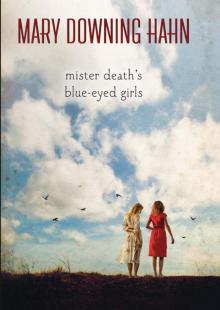 Mister Death's Blue-Eyed Girls
Mister Death's Blue-Eyed Girls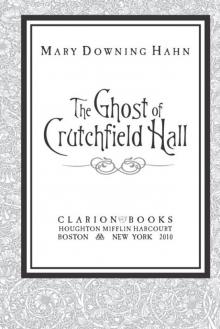 The Ghost of Crutchfield Hall
The Ghost of Crutchfield Hall Hear the Wind Blow
Hear the Wind Blow Time of the Witch
Time of the Witch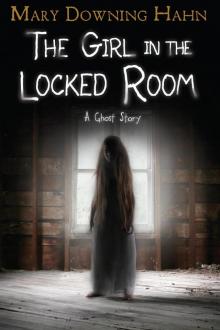 The Girl in the Locked Room: A Ghost Story
The Girl in the Locked Room: A Ghost Story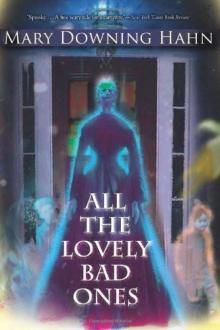 All the Lovely Bad Ones
All the Lovely Bad Ones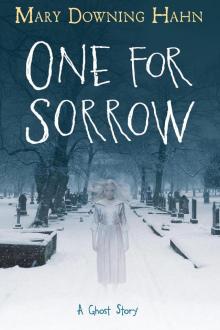 One for Sorrow
One for Sorrow Deep and Dark and Dangerous
Deep and Dark and Dangerous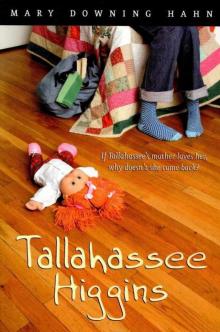 Tallahassee Higgins
Tallahassee Higgins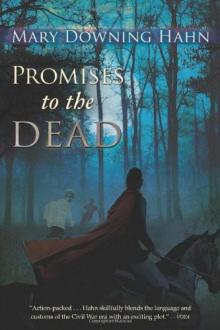 Promises to the Dead
Promises to the Dead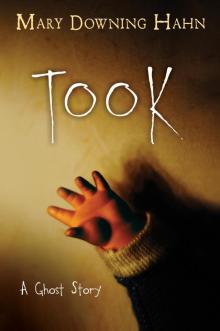 Took: A Ghost Story
Took: A Ghost Story Following My Own Footsteps
Following My Own Footsteps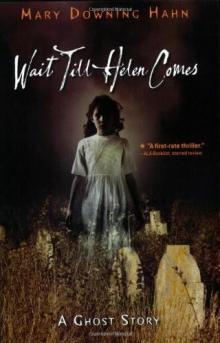 Wait Till Helen Comes: A Ghost Story
Wait Till Helen Comes: A Ghost Story Where I Belong
Where I Belong The Spanish Kidnapping Disaster
The Spanish Kidnapping Disaster Look for Me by Moonlight
Look for Me by Moonlight The Old Willis Place
The Old Willis Place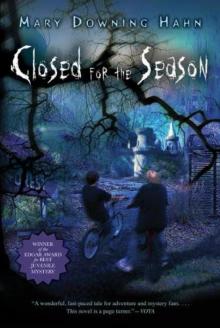 Closed for the Season
Closed for the Season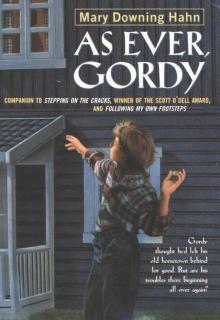 As Ever, Gordy
As Ever, Gordy Anna on the Farm
Anna on the Farm The Doll in the Garden
The Doll in the Garden Daphne's Book
Daphne's Book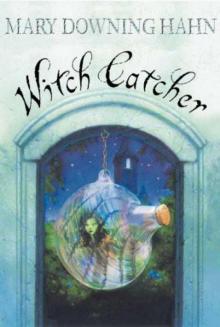 Witch Catcher
Witch Catcher The Gentleman Outlaw and Me--Eli
The Gentleman Outlaw and Me--Eli Wait Till Helen Comes
Wait Till Helen Comes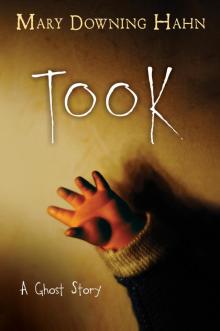 Took
Took A Haunting Collection
A Haunting Collection Anna All Year Round
Anna All Year Round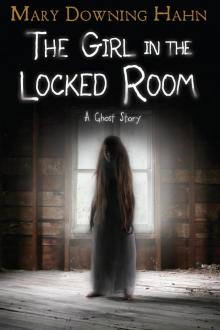 The Girl in the Locked Room
The Girl in the Locked Room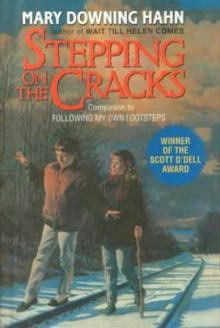 Stepping on the Cracks
Stepping on the Cracks